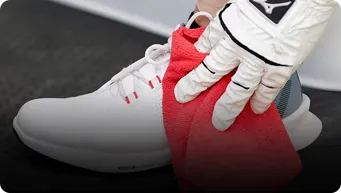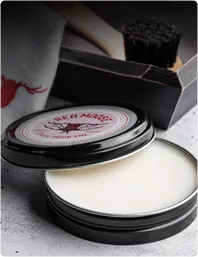The Art of Golf Shoe Maintenance: A Step-by-Step Guide on How to Clean Your Golf Shoes
Golf isn't just a sport; it's a passion that requires precision and concentration. And when it comes to playing your best game, your gear matters. One often overlooked yet crucial aspect is your golf shoes. Not only do clean golf shoes enhance your performance on the course, but they also extend the lifespan of your prized footwear. In this comprehensive guide, we will delve into the intricate world of golf shoe maintenance, exploring the different materials, tools, and methods you need to keep your shoes in top shape.
The Importance of Maintaining Clean Golf Shoes
Imagine stepping onto the green with pristine golf shoes that radiate both style and functionality. Clean golf shoes not only make a statement about your commitment to the game but also play a significant role in ensuring your comfort and performance. Dust, mud, grass, and stains not only mar the appearance of your shoes but can also affect your stability, grip, and overall swing.
Enhancing Performance and Prolonging the Lifespan
Properly cleaned and cared-for golf shoes can enhance your performance on the course. A clean sole provides better traction, while a well-conditioned upper maintains flexibility and comfort. Moreover, regular maintenance prevents the buildup of debris that can lead to wear and tear over time. By investing time in cleaning your golf shoes, you're also investing in their longevity, saving you money in the long run.
Understanding Golf Shoe Materials
Different Types of Golf Shoe Materials
Golf shoes come in various materials, each requiring a specific approach to cleaning and maintenance.
- Leather: Leather golf shoes exude class and elegance. To clean them, start by brushing off surface dirt and dust. Gently wipe the leather upper with a damp cloth to remove stains. Apply a leather conditioner to keep the material supple and prevent cracking.
- Synthetic Materials: Synthetic golf shoes are lightweight and easy to maintain. Clean the synthetic upper using a mixture of mild soap and water. For tough stains and scuff marks, use a soft brush or cloth. Avoid harsh chemicals that can damage synthetic material.
- Waterproof Materials: Waterproof golf shoes have a special membrane that needs care to maintain its functionality. Clean the waterproof membrane with a damp cloth and mild soap. Avoid using excessive water, as it can compromise the waterproofing properties. Dry the shoes thoroughly after cleaning.
Essential Tools and Supplies
Golf Shoe Cleaning Kit
Investing in a dedicated golf shoe cleaning kit can make the maintenance process much easier. These kits typically include a soft brush, a cleaning solution, and a conditioner.
Common Household Items as Alternatives
If you're in a pinch, everyday household items can be used for golf shoe cleaning. A soft toothbrush can serve as a substitute for a shoe brush, while mild soap diluted in water can replace dedicated cleaning solutions.
Choosing the Right Cleaning Products
When choosing cleaning products, opt for those specifically designed for golf shoes. Avoid harsh chemicals that might damage the materials or alter their appearance. Always perform a patch test on a small, inconspicuous area before using a new product on your entire shoe.
Pre-Cleaning Preparation
Removing Excess Dirt and Debris
Before diving into the cleaning process, remove excess dirt and debris by tapping the shoes together or using a soft brush.
Unlacing and Preparing the Shoes for Cleaning
Unlace your golf shoes to ensure you can clean every nook and cranny effectively. This also prevents the laces from becoming entangled during the cleaning process.
Tips for Protecting Delicate Shoe Components
Golf shoes often have delicate components like metal eyelets or intricate stitching. Use caution when cleaning around these areas to avoid damaging them.
Cleaning Methods for Leather Golf Shoes
Brushing off Surface Dirt and Dust
Begin by brushing off surface dirt and dust using a soft brush. This prevents scratching the leather during the cleaning process.
Cleaning and Conditioning the Leather Upper
Use a damp cloth or sponge to gently wipe the leather upper. For more stubborn stains, use a leather cleaner following the manufacturer's instructions. After cleaning, apply a leather conditioner to keep the material soft and supple.
Removing Stains from Leather
For tougher stains, create a mixture of mild soap and water. Gently scrub the stained area with a soft brush or cloth. Rinse with clean water and allow the shoes to air dry.
Polishing and Shining the Shoes
Finish off by polishing the leather using a quality shoe polish that matches the color of your shoes. Apply the polish evenly and buff to a shine using a clean, dry cloth.
Cleaning Methods for Synthetic Golf Shoes
Cleaning the Synthetic Upper
Create a mixture of mild soap and water. Dip a soft cloth or sponge into the solution and gently wipe down the synthetic upper to remove dirt and stains.
Removing Tough Stains and Scuff Marks
For stubborn stains or scuff marks, use a soft brush or toothbrush to scrub the affected area gently. Be cautious not to scrub too hard and damage the synthetic material.
Refreshing the Appearance of Synthetic Materials
To restore the shine and appearance of synthetic materials, wipe them down with a damp cloth and allow them to air dry.
Cleaning Methods for Waterproof Golf Shoes
Maintaining the Waterproofing Properties
Regular cleaning is essential to maintain the waterproofing properties of your shoes. Clean off dirt and debris that might compromise the effectiveness of the waterproof membrane.
Cleaning the Waterproof Membrane
Use a damp cloth or sponge with mild soap to clean the waterproof membrane. Avoid submerging the shoes in water, as excessive moisture can affect the waterproofing.
Drying and Reconditioning Waterproof Shoes
After cleaning, dry the shoes thoroughly, preferably at room temperature. To maintain the waterproofing, consider applying a waterproofing spray or conditioner as recommended by the manufacturer.
Cleaning Golf Shoe Soles
Removing Grass and Mud from the Spikes
Use a soft brush to remove grass and mud from the spikes and sole of your golf shoes.
Cleaning Non-Removable Spikes
For non-removable spikes, clean the area around them using a brush or a cloth.
Cleaning and Replacing Removable Spikes
If your golf shoes have removable spikes, remove them before cleaning. Clean the spikes separately and replace them once they're dry.
Maintaining Traction and Grip
Maintaining clean soles is crucial for maintaining traction and grip on the course. Regularly clean the sole of your golf shoes to prevent the buildup of dirt and debris.
Deodorizing Golf Shoes
Addressing Unpleasant Odors
Golf shoes can develop unpleasant odors over time due to moisture and sweat. Addressing these odors is essential for a comfortable experience on the course.
Preventive Measures to Minimize Odor
To prevent odor buildup, allow your shoes to air dry after each round of golf. Rotating between different pairs of shoes can also help reduce moisture and odor.
Storing and Maintaining Golf Shoes
Proper Storage Techniques
Store your golf shoes in a cool, dry place away from direct sunlight. Avoid placing heavy objects on top of them, as this can deform the shoe's shape.
Preventing Mold and Mildew
To prevent the growth of mold and mildew, make sure your golf shoes are completely dry before storing them. Use silica gel packs inside the shoes to absorb excess moisture.
Regular Maintenance Routines
Incorporate golf shoe cleaning into your regular maintenance routine. Set aside time after each game to clean and care for your shoes, ensuring they're always ready for your next round.
Conclusion
Maintaining your golf shoes is an art that combines aesthetics and performance. Clean shoes not only make a statement on the course but also contribute to a better overall golfing experience. By following these step-by-step cleaning methods and incorporating them into your routine, you'll ensure that your golf shoes serve you well for many games to come.
Clean golf shoes are crucial for maintaining stability, grip, and overall performance on the golf course. They also extend the lifespan of your shoes, saving you money in the long run.
- Choose the appropriate cleaning method based on your golf shoe material: leather, synthetic, or waterproof.
- Gather the necessary tools and supplies, including a golf shoe cleaning kit or household alternatives.
- Prepare your shoes for cleaning by removing excess dirt, debris, and laces.
- Clean and condition leather uppers, clean synthetic materials, and maintain waterproofing.
- Clean the soles, spikes, and traction components of your shoes for optimal grip.
- Address odors using natural deodorizers and preventive measures.
- Store and maintain your golf shoes properly to prevent mold, mildew, and damage.



 Free Shipping over $30
Free Shipping over $30
 Easy Returns
Easy Returns
















































Leave a Reply